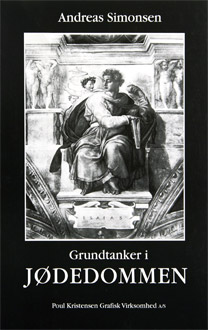Grundtanker i jødedommen
Udfra den opfattelse at jødedommen rummer en rigdom af skønhed, retledning og bærekraft fremdrager og kommenterer forfatteren grundlæggende jødiske ideer om gudsforhold og næsteforhold.
Som udgangspunkt og dokumentation tjener overalt citater fra jødedommens hellige skrifter: Fra Det gamle Testamente og fra Talmud, en meget omfangsrig skriftsamling fra perioden 200-700 e.Kr. Mens der er skrevet en hel del til oplysning om jødedommens ritualer, er dens bærende ideer ikke i tilsvarende omfang behandlet i alment læselige fremstillinger. Der er altså et stort behov for at få rede på, hvorvidt denne religion, der som kristendommens moderreligion kun er halvfremmed, indeholder religiøse og etiske tanker, som kunne hjælpe over for tidens og måske alle tiders livssynskrise.
Genoptrykt hos: Poul Kristensen Grafisk virksomhed. 2000 efter udgaven 1989.
ISBN: 87-7468-4116
I april 2014 udkom bogen på engelsk i Per K. Brasks oversættelse og udgivelse: FOUNDATIONAL THOUGHTS IN JUDAISM, som en ‘non fictive book’ hos FICTIVE PRESS. Se mere om Per K. Brask på fictivepress.com/per-brask.htm
Læs også anmeldelsen af bogen her:
Foundational Thoughts in Judaism is an eminently readable introduction to Jewish thought by Andreas Simonsen (1923 – 1991). This book examines the seemingly contradictory poles of Jewish thought (such as belief at once in God as Father and as Ruler of the Universe), and examines these as essential and complementary, or, in Simonsen’s thought as working in disconjunction with one another.
For me, the chief merit of this book is in its apologetic quality as it presents a plausible account of the nature of Jewish thought in a language that is accessible today. Specifically, Simonsen provides an account of the God of Israel as one who is not arbitrary or evolving (as many biblical scholars would have it), but who is capacious and polyvalent in his encounter with Israel. More than this, Simonsen teases out the ethical implications of belief in such a God. He does this not through abstraction, but through a dwelling on the internal consistency of Jewish law and life that is not immediately apparent. For example, in his lovely reflections on gratitude, Simonsen alerts us to the close link between gratitude and memory, which to Simonsen, is the foundation of Jewish ethics. As we remember God’s mercy toward Israel, we are compelled to be merciful in turn.
This book is grounded in the Bible and in the Talmud, but Simonsen approaches these texts in an organic way, as he explores specific concepts in Judaism. This book flows gracefully as the various texts help to illuminate the theme and the reader is adequately prepared to engage the text through Simonsen (and Brask’s) clear prose. It is a testament to the range of Simonsen’s knowledge that the Talmud and the Bible can be interwoven so seamlessly.
This book would serve as an excellent introduction to Jewish thought for those interested in the study of Judaism or for those who wish to deepen their own Jewish faith in light of modern criticism of religion in general and Judaism in particular. It offers an account of Judaism that is easily compatible with humanism—indeed; one might say that Judaism in this account is the proper orientation of humanism as it divests humanism of its tendency toward self-sufficient pride. It also offers a useful comparison between Christianity and Judaism which generally displays the compatibility of the teachings of these two major religions.
Dr Jane Barter Moulaison
Chair
Department of Religion and Culture
The University of Winnipeg

